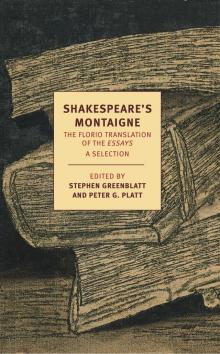Shakespeare's Montaigne


Author: Michel de Montaigne
Category: Other
Published: a long time ago
Series:
View: 335
Read OnlineAn NYRB Classics Original
Shakespeare, Nietzsche wrote, was Montaigne’s best reader—a typically brilliant Nietzschean insight, capturing the intimate relationship between Montaigne’s ever-changing record of the self and Shakespeare’s kaleidoscopic register of human character. And there is no doubt that Shakespeare read Montaigne—though how extensively remains a matter of debate—and that the translation he read him in was that of John Florio, a fascinating polymath, man-about-town, and dazzlingly inventive writer himself.
Florio’s Montaigne is in fact one of the masterpieces of English prose, with a stylistic range and felicity and passages of deep lingering music that make it comparable to Sir Robert Burton’s Anatomy of Melancholy and the works of Sir Thomas Browne. This new edition of this seminal work, edited by Stephen Greenblatt and Peter G. Platt, features an adroitly modernized text, an essay in which Greenblatt discusses both the resemblances and real tensions between Montaigne’s and Shakespeare’s visions of the world, and Platt’s introduction to the life and times of the extraordinary Florio. Altogether, this book provides a remarkable new experience of not just two but three great writers who ushered in the modern world.
Shakespeare, Nietzsche wrote, was Montaigne’s best reader—a typically brilliant Nietzschean insight, capturing the intimate relationship between Montaigne’s ever-changing record of the self and Shakespeare’s kaleidoscopic register of human character. And there is no doubt that Shakespeare read Montaigne—though how extensively remains a matter of debate—and that the translation he read him in was that of John Florio, a fascinating polymath, man-about-town, and dazzlingly inventive writer himself.
Florio’s Montaigne is in fact one of the masterpieces of English prose, with a stylistic range and felicity and passages of deep lingering music that make it comparable to Sir Robert Burton’s Anatomy of Melancholy and the works of Sir Thomas Browne. This new edition of this seminal work, edited by Stephen Greenblatt and Peter G. Platt, features an adroitly modernized text, an essay in which Greenblatt discusses both the resemblances and real tensions between Montaigne’s and Shakespeare’s visions of the world, and Platt’s introduction to the life and times of the extraordinary Florio. Altogether, this book provides a remarkable new experience of not just two but three great writers who ushered in the modern world.
List Chapter or Page:
Page 1Page 2Page 3Page 4Page 5Page 6Page 7Page 8Page 9Page 10Page 11Page 12Page 13Page 14Page 15Page 16Page 17Page 18Page 19Page 20 View More >> Mistletoe Kisses (Warming Up To Love Book 3)
Mistletoe Kisses (Warming Up To Love Book 3) Aurora Witch (Paranormal Hunter Academy Book 2)
Aurora Witch (Paranormal Hunter Academy Book 2) Vicious Gods: Paranormal Romance (Hell's Playground Series Book 1)
Vicious Gods: Paranormal Romance (Hell's Playground Series Book 1) My Sister's Secret Life: An incredibly suspenseful psychological thriller
My Sister's Secret Life: An incredibly suspenseful psychological thriller Catching Up With Daddy
Catching Up With Daddy Katie's Courage
Katie's Courage Khan: One dead body. One week. One question.... (DI Lomas Baxter series)
Khan: One dead body. One week. One question.... (DI Lomas Baxter series) Dead Sprint
Dead Sprint